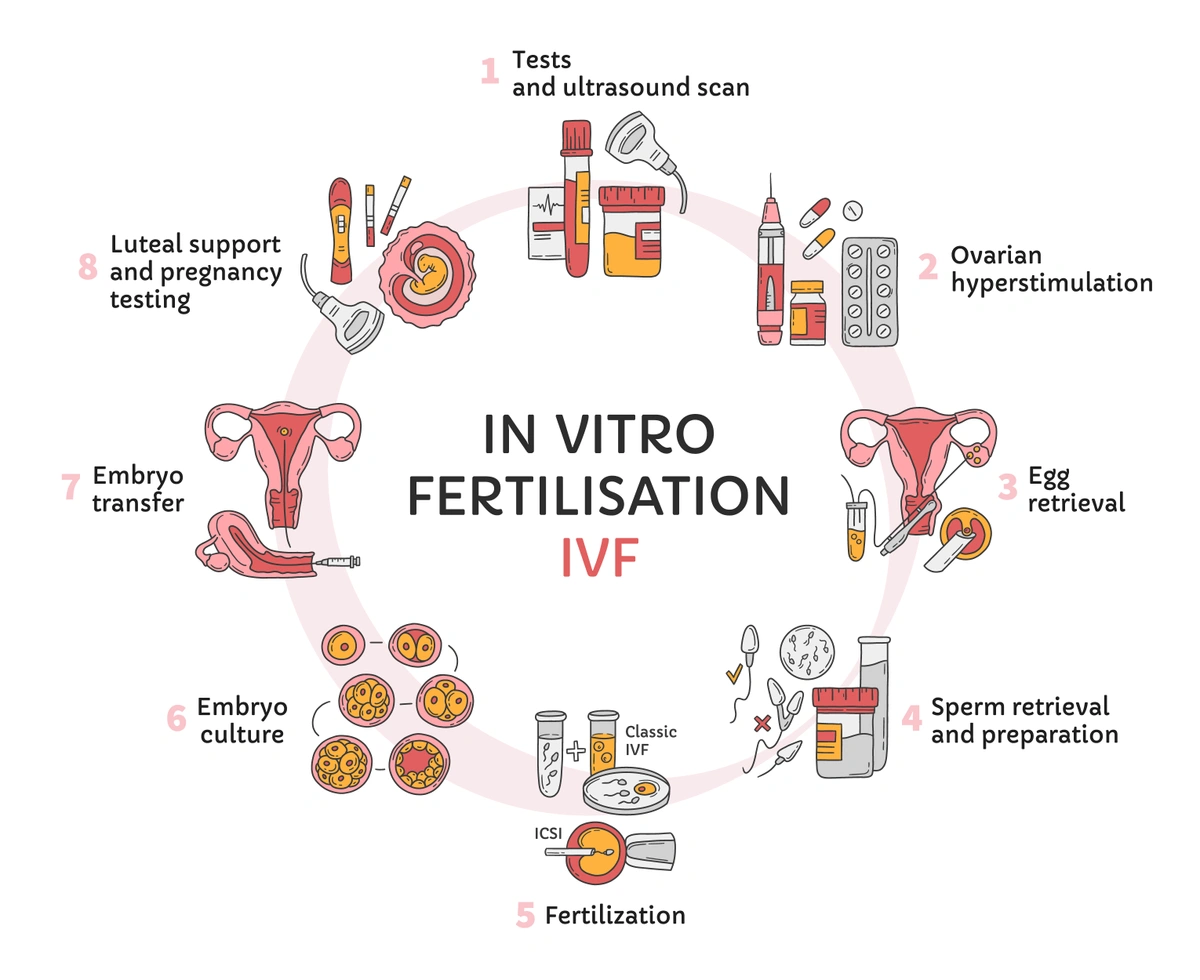
Tips to Prepare for Your Egg Retrieval
For many patients pursuing in vitro fertilization (IVF), the egg retrieval procedure marks a major turning point. It’s the moment where weeks of preparation come together — when the eggs your body has been stimulating and growing are carefully collected and prepared for the next stage of the IVF process. At Indiana Fertility Institute (IFI), our team wants you to feel informed, confident, and supported as you move through this important milestone.
Where Does Egg Retrieval Fit into My IVF Journey?
IVF is a multi-step process, and each stage builds on the last. Egg retrieval is the bridge between stimulating your ovaries and creating embryos in the lab. Once your eggs are retrieved, they are fertilized with sperm, either from your partner or a donor, and the resulting embryos are either transferred into the uterus or frozen for future use.
An illustration of the overall IVF journey
What Happens During Egg Retrieval?
The egg retrieval itself is a short, outpatient procedure performed under light sedation. Most patients don’t feel or remember anything. Using ultrasound guidance, your physician gently inserts a thin needle through the vaginal wall into each ovary, collecting the eggs from the follicles. The procedure takes about 30 minutes, and after a brief recovery period, you’ll go home the same day.
How Should I Prepare for the Procedure?
Preparation is one of the most important ways you can set yourself up for a smooth experience. Here’s what we recommend:
1. Stay on Track with Medications
-
Take your stimulation medications exactly as prescribed, and don’t hesitate to double or triple-check instructions if you’re unsure.
-
The trigger shot is especially time-sensitive. It’s given about 36 hours before your retrieval, and the timing determines whether your eggs are mature and ready. Many patients set multiple alarms or ask a partner or trusted friend to help with reminders.
2. Follow Eating and Drinking Instructions
-
Because anesthesia is used, you’ll need to have an empty stomach before the procedure. Typically, this means no food or drink (even water) after midnight the night before. Your care team will provide exact guidelines.
-
Stay hydrated the day before fasting begins. Drinking plenty of water ahead of time can make you feel more comfortable.
3. Plan for Transportation
-
You will not be able to drive yourself home after the procedure due to anesthesia. We recommend arranging for a partner, friend, or family member to drive you, and consider asking them to stay with you for a few hours afterward.
4. Clear Your Schedule
-
The day of retrieval should be reserved for rest. Most patients feel back to normal within 24–48 hours, but allow yourself the flexibility to take it easy.
-
If possible, keep the following day light as well, in case you need more recovery time.
5. Dress Comfortably
-
Wear loose-fitting clothing, especially around the waist. Many patients feel bloated from the stimulation medications, and comfort will make a big difference.
-
Slip-on shoes or socks can also make changing easier at the clinic.
6. Pack Light, but Thoughtfully
-
Bring your ID, insurance card, and any paperwork IFI has asked you to complete.
-
Some patients like to bring small comforts — such as a blanket, water bottle (for after), or a calming playlist for the car ride home.
7. Know What to Expect Physically Afterward
-
Mild cramping, bloating, or light spotting is normal. A heating pad and rest often help.
-
Avoid strenuous activity or heavy exercise until your doctor gives the all-clear.
-
Call IFI as soon as possible if you notice severe pain, heavy bleeding, fever, or shortness of breath, which could indicate a complication like ovarian hyperstimulation syndrome (OHSS).
8. Support Your Emotional Well-Being
-
It’s natural to feel nervous before retrieval. Deep breathing, meditation, or journaling can help calm pre-procedure jitters.
-
If you’re comfortable, bring a partner, friend, or family member to sit with you before and after. Having support can make the day feel less overwhelming.
9. Trust the Process
-
Remember that not every follicle will yield a mature egg, and not every egg will fertilize. This is expected and part of the process.
-
Focus on the big picture: egg retrieval is a vital step forward in your journey to growing your family.
Recovery and Next Steps
Recovery after egg retrieval is usually quick. Most patients are back to their daily routines within a day or two, though bloating and cramping can linger briefly. From there, our embryology team will closely monitor your eggs and embryos. You’ll receive updates on fertilization and embryo development, and together with your physician, you’ll decide on the next step — whether it’s a fresh transfer, genetic testing, or embryo freezing.
Final Thoughts
Egg retrieval is both a medical and emotional milestone in the IVF journey. The preparation you do in the days leading up to it — from taking your medications carefully to arranging support at home — can help ensure everything goes smoothly.
At Indiana Fertility Institute, our team is here to guide you through every step of IVF with clarity, compassion, and expertise. Preparing for your retrieval not only helps the process run seamlessly, but it also empowers you to feel more confident as you move forward on your fertility journey.
If you’re considering IVF or want to learn more about the egg retrieval process, schedule a consultation with IFI today. Together, we’ll create a personalized plan to help you move closer to building the family of your dreams!


